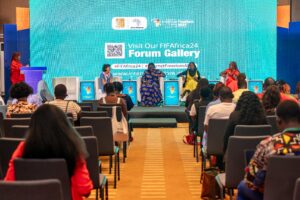In the first week of 2025, Mark Zuckerberg has made a key announcement that Meta is overhauling its content moderation policies, getting rid of fact-checkers “to focus…on tackling illegal and high-severity violations,” continuing a dangerous trend by Big-tech to go for profit and populism in the name of free speech. Though the changes are starting in the United States, many have already warned these changes will disable systems designed to combat hate speech.
“Instead of relying on professional fact checkers to moderate content, the tech giant will now adopt a “community notes” model, similar to the one used by X. This model relies on other social media users to add context or caveats to a post,” Conversation Africa reported.
For all working and concerned with the place of human rights, racial justice and gender equality, removing restrictions on “immigration, gender identity and gender” in political discourse is bound to bring forth even more challenges. “While claiming to protect freedom of expression, the shift, and its timing, appear politically motivated, reflecting an attempt to cater to specific political interests rather than genuinely enhancing this fundamental right,” says ARTICLE19.
These announcements come at a time when many activists and users are battling with disinformation and a surge in technology-facilitated gender-based violence. At the Forum on Internet Freedom in Africa (FIFAfrica) 2024 held in Dakar, Senegal, African Feminism and Feminists in Kenya hosted a panel titled “African Feminist Reflections on Gendered Mis/Disinformation in an Increasingly Hostile World—from Online, Home, Street and State” to explore how digital platforms while offering new opportunities for activism, have also become battlegrounds where feminist movements face increasing attacks.
Over the past decade, online feminist organizing has flourished, with a new generation of African women using digital platforms to resist misogyny, amplify their voices, and build community across borders. Movements have mobilized against femicide and gender-based violence in countries like Cameroon, Kenya, Nigeria, and South Africa, utilizing digital spaces for solidarity, movement-building, and knowledge production. However, the rise of misogyny and technology-facilitated violence against women has challenged the promise of the Internet as a public square for marginalized groups. Anti-rights movements are spreading misinformation, attacking feminist progress on issues such as reproductive rights and LGBTQIA+ freedoms, and replacing women’s history with dangerous, regressive narratives.
Compounding these challenges, the increasing dominance of large tech companies has left many users exposed to violence that platforms are not addressing and their algorithms amplifying hate speech and misogyny. This has led to the mainstreaming of violent rhetoric, contributing to a surge in violence against women and minoritized groups in Africa. Many digital communities and organizers are burdened with the immense mental strain of navigating these spaces. Image-based sexual abuse and disinformation are on the rise as more Artificial Intelligence tools are deployed.
The Internet as a Double-Edged Sword
The session, introduced by Sunshine Komusana, the campaign coordinator for #VisibleWikiWomen at Whose Knowledge?, aimed to address the challenges feminist organizing faces across digital platforms, in public spaces, and under state influence, with contributions from feminists across East, South, West, and North Africa.
Rosebell Kagumire, editor of African Feminism, moderated the session and expressed solidarity with African communities marginalized by the mainstream media, including communities in the DRC, Sudan, Ethiopia, Somalia, and Mozambique, and called for continued efforts to understand their struggles and reflect them to the world in solidarity. She acknowledged how African women have leveraged the internet to mobilize, amplify their voices, and foster cross-border solidarity.
The keynote speaker, Kiki Mordi, an investigative journalist and gender equality advocate, delved deeper into the issue, describing the current onslaught of gendered misinformation as an “information disorder.” She explained that this phenomenon is not just about controlling narratives but also about perpetuating patriarchal structures that aim to silence women and feminists. “Feminist leaders and women politicians, who are often at the forefront of progressive movements, are disproportionately targeted, with attacks designed to undermine their dignity, safety, and activism,” she said.
Mordi called for collective action to resist these digital threats and actively reshape the online landscape. She urged feminist movements to go beyond analyzing the problem and focus on developing sustainable solutions that reclaim control over narratives and create safer online environments for all.
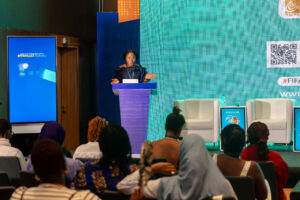
Feminist leaders across the continent shared insights into the challenges and opportunities within their respective contexts. Henda Chennaoui, founder of Tunisia’s first intersectional feminist school, spoke about how traditional media, social platforms, and political institutions work in tandem to spread hate speech and fascist ideologies. In Tunisia, she noted, “Feminists are often criminalized and labeled as enemies of the state. These harsh realities underscore the need for innovative resistance against institutionalized disinformation.”
Senegalese journalist and feminist activist Fatou Warkha Sambe discussed the critical role of feminist media in combating biased narratives that reinforce patriarchal norms. “By amplifying women’s voices and stories, feminist media not only challenge harmful stereotypes but also foster international solidarity, bridging local and global struggles.”
Serai Chisala, a Malawian lawyer and founder of the Gender and Justice Unit, emphasized the importance of intergenerational discourse in feminist activism. She pointed out the invaluable lessons that today’s feminists can learn from past generations, who resisted patriarchy without the advantages of digital tools. She also spoke about technology-facilitated gender-based violence and strategies for mitigation and response.
Speakers echoed each other on the interconnected nature of gender, race, class, and power. Nancy Houston, co-founder of Feminists in Kenya, urged feminists to push for narrative justice by communicating their messages beyond their immediate circles. She stressed the importance of curating political education in ways that appeal to a broader audience, effectively countering the emotional propaganda used by anti-rights groups.
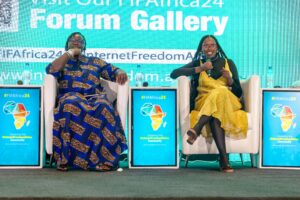
Gambian activist Sophie Manneh highlighted the challenges young feminists in her country faced during the recent threats to the anti-FGM law enacted in 2015. Despite facing opposition from religious conservative groups and even Women Parliamentarians, young feminists relied on social media to pressure a reluctant government, demonstrating the critical role that digital platforms can play in driving social change. Disinformation on what FGM is and against the work of feminist organisers was rife in the period leading up to the parliamentary debates.
Abra Rosaline Tsekputa, the Regional Lead for Francophone countries at Purposeful and a member of Les Negresses Feministes from Togo, highlighted the importance of intentional funding to mobilize feminist movements effectively. She shared the success of campaigns that bridged cultural, traditional, and religious divides to foster a deeper commitment to feminist activism.
Navigating Emerging Threats and Defending Digital Safety
Jamila Abbas, Program Lead at Chevs, noted that while the internet provides young feminists with platforms to discuss sensitive issues, it also exposes them to threats such as doxxing and phishing. Abbas emphasized the importance of collective care to ensure individual and movement-wide safety in these precarious digital spaces.
Masana Mulaudzi expressed concern about TikTok’s algorithms, which use data on users’ gender that make it easier to target young men with content from the Manosphere and toxic creators that are driving polarization.
Omolara Oriye, lawyer and anti-colonial feminist researcher, reminded the room that the ultimate goal of disinformation is to corrupt consciousness, marginalize the oppressed, and replace their values. She raised the alarming ways in which many Africans see being subordinates to Western powers and victims of colonial consolidation as some inevitable occurrence, pointing out the complicity of African governments in creating an atmosphere of fear. She questioned the prioritization of profit over people and capitalist gains over community welfare, prompting her to suggest that organizing should focus on psychological, mental, spiritual and embodied well-being.
Many pointed to emerging technologies such as deepfakes and the use of AI, urging feminist movements to stay ahead of these threats by advocating for legal frameworks that protect activists and address the nuances of rapid technological advancements.
Building Solidarity
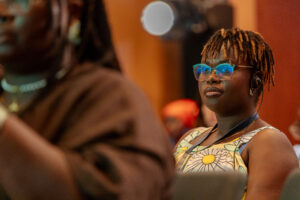
Many highlighted that digital economies are directly linked to extraction and violence being witnessed in several African countries. Nadine Kampire, an activist from the Democratic Republic of the Congo, brought attention to the layered trauma experienced by women in war-torn areas, where digital platforms exploit and perpetuate violence. She called for solidarity with these communities and urged feminists to amplify their narratives to ensure they are not erased.
Chennaoui argued for the politicization of all struggles by integrating feminism into the heart of political discourse. She advocated for recognizing feminist movements as anti-racist, anti-capitalist, and anti-sexist, framing their work as part of a broader social justice agenda rather than simply focusing on identity or interpersonal issues.
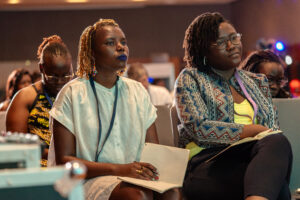
Kagumire called for greater engagement on questions of culture and values in a time where anti-rights groups hijack ‘African culture’ to defend discrimination and violence and often regurgitate on digital spaces. “We are living, breathing culture as we go; culture is not static.” African women and queer people often face the weaponization of “values” when asserting their rights, as if there is one singular African value, overlooking the thousands of diverse values that exist across the continent. “As we fight disinformation and create healthier spaces to reclaim our power, we must embrace a future that reflects the full spectrum of gender expressions and identities within our societies,” she said. “By looking beyond the colonial lens, we can tap into the power embedded in our histories to advance rights. Feminist movements must continue reimagining the digital landscape, prioritizing humanity, dignity, and freedom as we assert our rights and reclaim our power.”
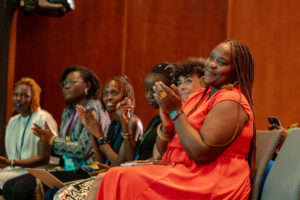
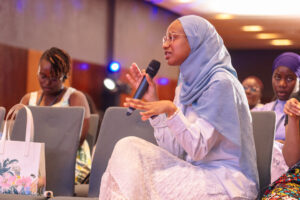
The session created a space for reflection and action by sharing alternative narratives, best practices, and strategies. It underscored the importance of solidarity and collaboration in resisting oppressive systems and safeguarding the hard-won progress of feminist organizing. Conversations at FIFAfrica 2024 reaffirmed that African feminists are not only resisting today’s challenges but also actively laying the groundwork for a more equitable and just future. By amplifying their voices, building networks of support, and prioritizing collective care, African feminists continue the struggle to create and reclaim their space in the digital world and shape safe and inclusive feminist futures.
The partnerships with CIPESA, Purposeful, Whose Knowledge?, and AWDF that supported the session are vital and reaffirm the importance of centring feminist perspectives in the ongoing struggles for internet freedom, digital rights, and justice.
Vivienne Kabarungi is an African Feminist who is passionate about feminist movement building. She believes in the power of art and storytelling as tools for imagining an equitable and liberated future for us all.

